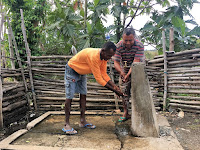A lack of rain, resulting in a dry and dusty drought has become the norm for most of the inhabitants of Timor Leste and has resulted in a drastic change of lifestyle for many.
After travelling 70km, which took three hours along terrible roads (when does a road lose the right to be called a road?) with some stunning views, I arrive in the district of Baucau, in the sub-village of Caicua. The greeting is warm and the coffee is sweet, and as we sit speaking about the challenges and the past, Luis, the Caicua village chief, expresses thanks to World Vision and the Australian people for the (literally) lifesaving interventions that have meant, among other things, that water is available for some within ten meters of their homes.
In years past, the majority (80%) of Timorese people were engaged in agricultural livelihoods, with most of these working their own subsistence farms. (In 2009), about 67,000 households grew coffee, with a large proportion being the poorest. Before the drought, when there was water, many in Caicua grew rice which fed their families and supplied some extra income. But when the rains stopped, so did the paddy field yields. Today most of the village relies on gathering firewood to sell in larger markets and the harvesting of palm tree products for building materials and consumption.
Life has changed for the villagers; those that stayed have adapted their lifestyles to the new reality, but many have left and moved to larger towns where water is still available.
World Vision, with Australian Government (DFAT) funding began operating in this district in 2009, before the drought, but in the last two years together with the community World Vision has established new water points, trained people in appropriate farming methods, value add food processing, and financial management through savings groups.
The impact of the supply of water should not be underestimated. Following one of the possible
‘impact chains’ reveals that the results of the water include: adequate water supply for household needs (drinking, cooking and cleaning) and home garden use: resulting in increased and diversified garden yield: which improves family consumption and health (increased vitamin A, iron and protein) and provides surplus yield available for market: which increases household income: ‘extra income’ can be invested in village savings groups (70% of members are women): meaning that children can attend school because parents can pay for school uniform and school resources. Impact? Children are educated: children are healthier: Children and their parents have better likelihood of living life in all its fullness.




